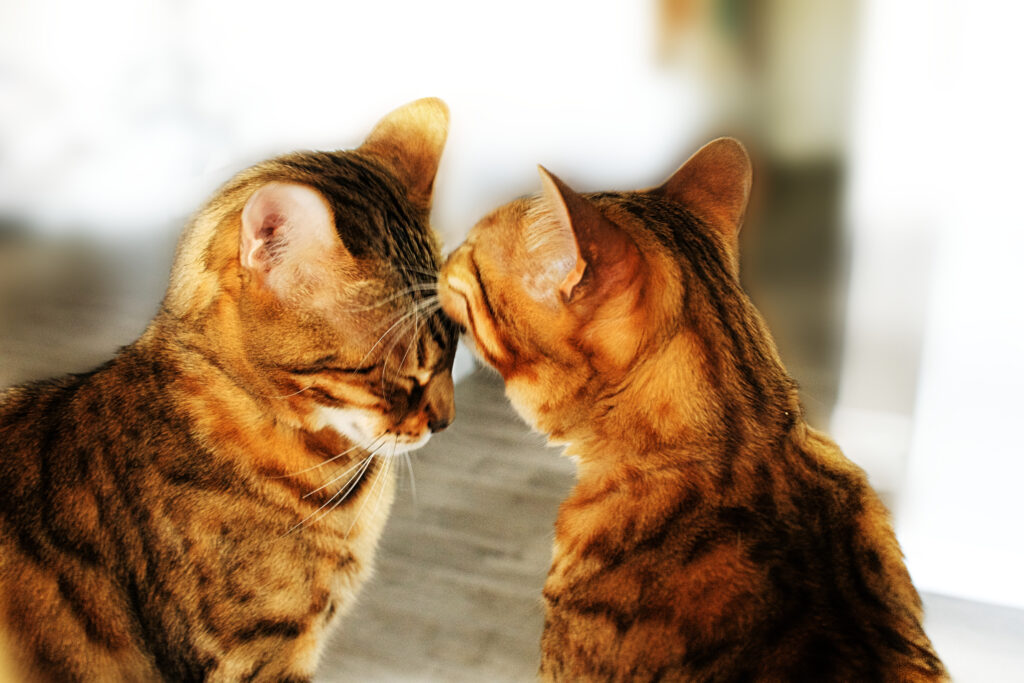Enter the aromatic and leafy allies – herbs, nature’s little powerhouses making their mark in pet health.
When it comes to herbs for cats & dogs , you might think… wait a minute! Furballs and herbs seem like an unlikely duo, but in the magical world of pet wellness, these two worlds come together very well.
While dogs chasing their tails, and cats with their delightful disregard for gravity, brings joy to our lives, but, they also come with their share of health issues and quirks.
Paws and Plants: Unveiling the Wonders of Herbs for Cats & Dogs!

It’s a Symphony of Herbal Remedies for Pet Wellness
Picture this: a pet-friendly herb garden where basil waves at the pups, dandelions high-five the kitties, and parsley cheers on everyone. It’s not just a whimsical thought. The world of herbs holds an array of remedies to assist our furry pals in their health journey.
Understanding Herbs for Pets
First, let’s debunk the mystery behind herbs for our pets.
Much like how we turn to chamomile tea for a good night’s sleep or peppermint for a tummy ache, our pets have their own herbal repertoire for various ailments. From anxiety-soothing lavender to parsley for freshening breath, herbs offer a holistic approach to pet wellness.
A Bouquet of Wellness: Popular Herbs for Cats & Dogs
Now, let’s roll out the herbal red carpet and introduce the stars of the show! 🌟
Lavender: The “chill pill” herb – perfect for those anxious tails and twitching whiskers.
Chamomile: Not just for teatime! Soothes upset tummies and helps with sleep (for both pets and humans).
Echinacea: Boosts the immune system, keeping tails wagging and purrs roaring.
Parsley: Has antimicrobial properties which are good for your pet’s oral health. Not only that, but it can also be helpful for treating urinary tract infections, making it a hero in the herb world!
Rosemary: Talk about a multi-talented herb! It’s high in antioxidants, and can help aid digestion in our pets.
And that’s just a sniff of the herbal bouquet!

Herbs for Dogs:
Herbal Remedies for Pets in Supplement or Powder Form (particularly for older dogs):
Turmeric: It contains curcumin, a compound celebrated for its anti-inflammatory properties. In pets (and humans), it can potentially aid in managing arthritis, digestive issues, and even support heart health.
Note: It’s important to note that while turmeric is generally safe for dogs, it’s recommended to introduce it gradually and in controlled amounts to avoid any digestive upset.
Boswellia: Also known as Indian frankincense, Boswellia has anti-inflammatory properties and can aid in reducing joint inflammation and improving mobility in dogs and humans!
Yucca: Contains saponins and polyphenolics that may help reduce swelling and pain associated with arthritis.
Nettle: Contains histamines and anti-inflammatory compounds that may help reduce pain and inflammation in arthritic joints.
Licorice Root: Contains glycyrrhizin, which may help reduce inflammation and alleviate joint pain.
Meadowsweet: Contains salicylic acid, which can act as a natural pain reliever and anti-inflammatory agent.

Herbs for Cats:
Catnip: The herb that sends most cats into a state of blissful euphoria, catnip isn’t just a source of entertainment. For many cats, this plant provides a surge of energy and relaxation, often resulting in playfulness. It’s an excellent tool for behavior redirection, relaxation, and overall well-being.
Dandelion: Despite its reputation as a common lawn weed, dandelion can offer surprising health benefits for cats. It’s a natural diuretic and can aid in kidney function and urinary health. Additionally, its high nutrient content can supplement Fluffy’s diet, providing essential vitamins and minerals.
Valerian: Known for its calming effects, valerian is a go-to herb to soothe anxiety or stress in cats. Often used in similar ways as catnip, valerian can induce a state of relaxation and calmness in some feline friends.
Echinacea: This herb boasts immune-boosting properties. For cats, echinacea can be beneficial in supporting their immune system and aiding in their overall health.
Goldenseal: Goldenseal is recognized for its antimicrobial and anti-inflammatory properties. It can be useful in supporting Fluffy’s health, particularly in fighting infections and reducing inflammation.
While these herbs are generally considered safe and beneficial for Fluffy, it’s crucial to introduce new elements to their diet gradually and consult with a veterinarian to ensure these herbs align with Fluffy’s specific health needs and any existing medications.
Each pet is unique, and their response to herbs may vary. It’s always wise to observe any changes in behavior or health when introducing new elements to their diet or routine.
Remember, the golden rule remains: Consult your vet before making significant changes to your pet’s diet or health regimen, including incorporating new herbs. They can offer tailored guidance based on your pet’s individual health requirements and potential interactions with existing treatments.

But Caution Please!
While many herbs offer health benefits for pets, some can be harmful or toxic if ingested.
Here are a few herbs that are generally NOT recommended for pets:
- Lilies: Lilies, particularly for cats, are extremely toxic and can cause kidney failure.
- Aloe Vera: While this plant is beneficial topically for humans, it can cause vomiting, diarrhea, and other issues in pets if ingested.
- Marijuana (Cannabis): Pets are extremely sensitive to cannabis, and ingestion can lead to various symptoms, including lethargy, incoordination (muscle control), and in severe cases, even coma.
- Sago Palm: This plant is highly toxic to pets and can cause liver failure.
- Azaleas and Rhododendrons: These flowering plants can cause vomiting, diarrhea, and potentially more severe issues if ingested by pets.
- Mistletoe: When ingested, mistletoe can cause vomiting, diarrhea, difficulty breathing, erratic behavior, and potentially more serious issues.
- Yew: This evergreen plant is highly toxic to pets and can cause sudden death due to its effects on the heart.
- Foxglove: This plant contains toxins that can affect the heart and cause various health issues if ingested.
- Pennyroyal: While sometimes used in herbal remedies, pennyroyal is highly toxic to pets and can cause liver failure.
- Garlic and Onions: While these are more culinary herbs, they can be harmful to pets, especially in large quantities, potentially leading to anemia.
It’s always advisable to consult a veterinarian before introducing any new herb or plant into a pet’s environment or diet. When in doubt, it’s best to err on the side of caution and avoid exposing pets to potentially harmful herbs or plants.
For more information on toxic and non-toxic plants for pets, go here.
Giving Herbs to Cats & Dogs: Mixing Science with Pet Antics
But wait, how do we serve up these herbal delights to our furry pals?
From teas to tinctures, herbal supplements to incorporating them in treats, there are plenty of ways to make your pet feel like the ultimate gourmet herb connoisseur.
Pawing at the Pros: Herb Heroes at Your Service
Now, before you start garnishing your pet’s meals with a dash of this and a sprinkle of that, remember – herbaceous adventures are best done with expert advice. A chat with your vet or a herbalist can ensure the perfect herbal symphony for your pet’s health.
Real Tails of Herbal Success
Testimonials from pet owners are like the sprinkles on the cupcake! From smoother digestion to a calmer demeanor, these stories highlight how a dash of herbal magic made tails wag with joy.
Final Tips on Herbs for Cats & Dogs
It’s always better to be safe than sorry when it comes to your furry friend’s well-being.
If there’s even a slight inkling that Fido or Fluffy may have nibbled on something questionable, don’t delay—get in touch with your vet right away.
And if you’re growing herbs in your garden, ensure the safety of your pet by keeping them out of paw’s reach. Erect a barrier around your herbal haven, consider elevated planters, or employ other pet-proofing methods to create a herbal no-go zone.
Remember, before introducing any new herb, it’s crucial to seek guidance from your vet. Even seemingly safe herbs might interact with existing medications or supplements, emphasizing the importance of correct dosages and overall health compatibility. Your vet’s counsel ensures your pet reaps the benefits of herbs without any unwanted side effects.
Remember, with a sprinkle of knowledge and a dollop of caution, your pet can enjoy the herbal goodness while prancing through their days with tail-wagging enthusiasm!
